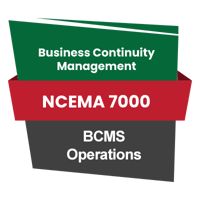Chapter 9: Review and Evaluation
| Disclaimer |  |
Click the "NCEMA 7000 Simplified" icon to read the detailed "Disclaimer" and "Usage of this Content." | |
| Proper Usage of Guidebook | |||
Review and Evaluation of the NCEMA 7000 BCMS Guidelines

 This article explores the review and evaluation aspects of the NCEMA 7000:2021, emphasising its importance in establishing a robust Business Continuity Management System (BCMS) for UAE organisations.
This article explores the review and evaluation aspects of the NCEMA 7000:2021, emphasising its importance in establishing a robust Business Continuity Management System (BCMS) for UAE organisations.
The goal is to understand how the guidelines help organisations identify and address risks and threats while ensuring the seamless continuation of operations in challenging circumstances.
This set of guidelines is a critical resource for businesses, government agencies, and private sector organisations. It provides a structured approach to building and maintaining effective BCMS.
The NCEMA 7000:2021 standard aligns with international best practices, drawing upon frameworks such as ISO 22301, to create a robust BCMS tailored to the unique risks and challenges organisations face in the UAE.
The guidelines offer detailed specifications on risk assessment, business impact analysis, and continuity planning, ensuring that organisations can proactively manage disruptions and maintain critical business functions during times of crisis.
These standards address immediate operational continuity and foster long-term resilience, safeguarding public and private assets across various sectors.
A critical element of the NCEMA 7000:2021 guidelines is the emphasis on continuous improvement through regular review and evaluation of the BCMS.
Organisations are encouraged to establish a dynamic feedback loop where performance is consistently monitored, evaluated, and refined to ensure that the system remains effective and adaptable to emerging threats.
This commitment to ongoing assessment helps ensure that organisations in the UAE are well-prepared to handle any crisis, whether a natural disaster, technological failure, or other types of disruptions, thereby contributing to the overall stability and security of the nation.
Key Components of NCEMA 7000:2021
Governance and Leadership Commitment
The standard underscores the importance of senior management's commitment to BCM.
Top leadership involvement ensures the integration of BCM into the organisational culture, empowering teams to prioritise continuity and resilience.
A governance structure that supports decision-making during emergencies and crises is essential.
Risk Assessment and Business Impact Analysis (BIA)
The standard emphasises a systematic approach to risk assessment or Risk Analysis and Review (RAR) and business impact analysis (BIA).
These assessments help organisations identify vulnerabilities, assess potential impacts on operations, and prioritise resources to mitigate risks.
The BIA should consider immediate and long-term consequences, including financial, reputational, and operational impacts.
Business Continuity Strategies (BCS)
NCEMA 7000:2021 outlines the need for organisations to develop continuity strategies tailored to their specific risks and operational requirements.
This includes identifying critical business functions and establishing BCM strategies to ensure minimal downtime. BCM strategies should cover personnel, facilities, IT systems, supply chains, and communications.
Operational Continuity and Response Plans
The document stresses the importance of having robust BCM and response plans for various types of emergencies, from natural disasters to cyber-attacks.
The BCM plans must be actionable, regularly tested, and adaptable to changing circumstances.
Training, Awareness, and Communication
One of the essential elements of NCEMA 7000:2021 is the training and awareness program for staff at all levels. Regular drills, simulations, and awareness campaigns ensure employees understand their roles during disruptions.
Communication protocols must be established to ensure clear, accurate, and timely information dissemination during emergencies.
Monitoring, Review, and Evaluation
The guidelines emphasize continuous monitoring and evaluation of the BCMS to ensure its effectiveness.
Regular internal and external audits, testing, and simulations help identify areas for improvement. By reviewing business continuity practices regularly, organisations can adjust strategies based on evolving risks and lessons learned from past incidents.
The Role of Review and Evaluation in Continuous Improvement
The review and evaluation phase is integral to the success of any BCM program. NCEMA 7000:2021 outlines a structured process to evaluate BCM performance, ensuring the BCMS remains relevant and responsive to emerging threats.
Internal Audits and Assessments
Regular internal audits are necessary to evaluate BCM's compliance with the NCEMA 7000:2021 guidelines.
These audits focus on assessing the effectiveness of the BCM strategy, risk mitigation measures, recovery capabilities, and compliance with regulatory requirements.
Conducting these audits and taking corrective actions before a crisis occurs can help organisations uncover gaps or weaknesses in their continuity plans.
Lessons Learned and Continuous Improvement
After each business disruption or test scenario, organisations must conduct thorough post-incident reviews to understand what worked and what did not.
Lessons from such reviews inform future preparedness strategies and help organisations refine their recovery processes. Continuous improvement is a core principle, ensuring that the BCMS evolves as new threats emerge and organisational priorities shift.
Engagement with External Stakeholders
External evaluations, such as engagement with auditors, consultants, and regulatory bodies, can provide invaluable insights into the organisation's BCM effectiveness.
External feedback may highlight areas of improvement or recommend adjustments based on global trends, technological advancements, or legal requirements.
Evaluation Against Global Standards
The NCEMA 7000:2021 guidelines are designed to align with international standards such as ISO 22301, ISO 22320, and ISO 22324, ensuring that UAE organisations are compliant with globally recognised BCM principles.
By incorporating these international benchmarks, organisations can benchmark their performance against global best practices, ensuring that they meet local requirements and stand out as leaders in crisis management and operational resilience.
Summing Up ...
The NCEMA 7000:2021 guidelines provide organisations in the UAE with a robust and structured framework for establishing effective BCMS.
The guidelines align with global standards such as ISO 22301, ensuring that organisations are compliant with local regulations and capable of managing risks effectively in a rapidly evolving global landscape.
The focus on operational resilience, risk mitigation, and BCM strategies empowers organisations to safeguard their assets, operations, and reputation during crises.
A key takeaway from the NCEMA 7000:2021 is the importance of regular review and evaluation in maintaining a resilient BCMS. By implementing continuous monitoring, testing, and post-incident reviews, organisations can identify areas for improvement and adapt their strategies to emerging threats.
This proactive approach fosters a culture of resilience, where businesses constantly refine their ability to respond to disruptions, minimise downtime, and recover quickly. The lessons learned from each evaluation help enhance preparedness and ensure that future crises are managed more effectively.
Ultimately, the guidelines in NCEMA 7000:2021 are not just about compliance—they are about future-proofing organisations against the challenges that lie ahead.
By adopting these guidelines, UAE organisations can build a sustainable BCM system that enhances their ability to weather crises while contributing to the broader stability and security of the UAE. As threats continue to evolve, so must the strategies to mitigate them.
Organisations that embrace the principles of continuous improvement and operational resilience outlined in NCEMA 7000:2021 will be better positioned to thrive in an unpredictable world, ensuring they remain secure, competitive, and capable of maintaining critical operations.
|
Business Continuity Management Series: UAE National Emergency Crisis and Disaster Management Authority (NCEMA) 7000 |
||||
 |
 |
 |
 |
 |
 |
 |
 |
 |
 |
More Information About Business Continuity Management Courses

 To learn more about the course and schedule, click the buttons below for the BCM-300 Business Continuity Management Implementer [B-3] course and the BCM-5000 Business Continuity Management Expert Implementer [B-5].
To learn more about the course and schedule, click the buttons below for the BCM-300 Business Continuity Management Implementer [B-3] course and the BCM-5000 Business Continuity Management Expert Implementer [B-5].
![Register [BL-B-3]*](https://no-cache.hubspot.com/cta/default/3893111/ac6cf073-4cdd-4541-91ed-889f731d5076.png) |
 |
 |
 |
 |
 |
![FAQ [BL-B-3]](https://no-cache.hubspot.com/cta/default/3893111/b3824ba1-7aa1-4eb6-bef8-94f57121c5ae.png) |
If you have any questions, click to contact us.
|
 |
 |
 |
 |


![Email to Sales Team [BCM Institute]](https://no-cache.hubspot.com/cta/default/3893111/3c53daeb-2836-4843-b0e0-645baee2ab9e.png)

